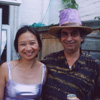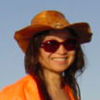Journal entries
Le Bon Journal
About
Search
Contact
Readers write
Show your support
Bon Journal
Save the Ark Gallery of Yousif Naser
an appeal by Anne Ku
The Ark Gallery in London, founded by Iraqi artist-in-exile Yousif Naser, is in crisis. At time of writing, it faces an uncertain future ---- a new home yet to be determined, at best. No home, at worst. Where will the community it serves go if it disappears?
When I learned of the Ark's existence in 2002 in South Ealing, I was soon introduced to a world of self-expression, of artists, writers, poets, and musicians. Yousif Naser, who contributed to the artistic life in Ealing which at that time centred around the Pitshanger Manor Art Gallery, held events in his own space --- his studio which he named The Ark.
In hindsight it was Yousif who helped me make my transition from a full-time permanent salaried employee to a self-employed portfolio careerist on part-time temporary contracts. I volunteered my time, so I thought, to make his art administration more efficient. While learning about his passion, I built his first web site which contained his artworks, his events, and mentions in the press. In the process, he introduced me to creative people with their own agendas, a far cry from the corporate world I left behind.
"Artists want to do art," he said. "Not admin."
In 2002-2003, Yousif was inundated with requests by other artists and organisers who wanted to use his studio for exhibitions, workshops, concerts, etc. He had been given an almost derelict building on the busy South Ealing Road next to the famous cemetery. He renovated it to a working space for himself.
Was there a lack of space in Ealing for art? No, there's the Pitshanger Manor Museum which has plenty of high-ceiling spaces but something was direly missing. The warmth and open invitation, or rather, the personal touch of an artist, perhaps? Instead, there was an abundance of bureaucracy and few vague clues to how to get access to a good space. Yousif offered his own studio and his personal contacts, which were wide and many.
All the events that Yousif organised, to my knowledge, were extremely well attended. The place was always packed. Full house. Full of life. Overflowing with people from all walks of life, speaking different languages, and exuding the artistic ambience not present at Pitshanger Manor, the official gallery at the time. He had neither the funding nor the "official" status that well-paid art administrators and managers had. But he managed to invigorate a community in his humble studio.
After I left London, I learned that his studio was to be "taken away" --- but he assured me that the Ealing Council would find another place for him. In due course, a new location was found. Although it was more central, just behind the Ealing Town Hall, it was not as cozy or independent as the South Ealing building for he was to share the new studio with a department of the Ealing Council. Unheeded, Yousif Naser quickly turned his new place into a budding centre of activity --- his studio by day and art gallery when needed.
Last September (2006), Yousif Naser included me in his programme of exhibitions of his paintings on war. It was a project started as early as 2002 with different artists visiting his studio to paint their impressions of war. I played a piece from Elgar's Enigma Variations. Again, it was a busy evening of live music (cello and piano as background to poetry reading) and intellectual conversation.
Meanwhile, where was the "official" gallery with its colourful brochures? The Pitshanger Manor House and Gallery occupies a magnificent space surrounded by the trees and gardens of Walpole Park. I stopped going to the Pitshanger Manor Art Gallery after two of my friends experienced a difficult time with the management as employees. Despite having redressed their concerns (including an internal hearing), they never set foot in the house again. Only earlier on, I had enjoyed playing background music on the lovely Bluthner grand piano (which was donated by Vangelis) for a wedding reception and even posed for my first set of professional musician photos.
The latest news is that Yousif Naser is once again being told that his studio -- the Ark --- is being moved, or rather, removed. Where will he go now? More importantly, where will the art community go? Why not the Pitshanger Manor Art Gallery?
I was asking myself that question when I lived in London and organised house concerts in my tiny home. I couldn't afford the hiring fees for Pitshanger Manor House's grand rooms or the grand piano. Since Pitshanger Manor did not attract an automatic audience, I would have had to rely on my own invitations and publicity to ensure attendance. Why spend money at someone else's property when you have to do all the work? That's precisely why Yousif Naser organised exhibitions at his own art studio, however small and cramped.
Artists, writers, poets, and musicians need space to work and show their work. They want audiences who appreciate and give them feedback. They need to expose their work. Yousif Naser has built a thriving community by offering his own studio for the meeting of like minds. Why doesn't the official art space in Ealing provide this connection?
8 January 2007
Related links:
Yousif Naser on Art Ministry web site
latest news

chalk portrait by Yousif Naser
Paul Makepeace, portrait by Yousif Naser

Anne Ku with Yousif Naser
NOTE @ 4 February 2009
This article has been amended (passage in bold) after an e-mail request (dated January 2009) from legal services of Ealing Council acting on behalf of PM Gallery House to remove the words "management abuse" and "going to court."
After checking with my two friends who had worked there, consulted with two lawyers, local press, I amended the text in hopes that the Council will now read the rest of the article and answer my question.
The question is simply: "Why doesn't the Pitshanger Manor Museum (now called PM Gallery and House) consider giving space for Yousif Naser?"
When I last saw Yousif in mid January 2009, only two years after he faced the threat of eviction (hence this article), he was busy moving to the top of Acton Town Hall, where there is no Internet access or direct phone line for him. On top of it all, he faces a 5 pm curfew, so he cannot work after 5 pm on the premises.
| Tell your friends about this Bon Journal entry: |
